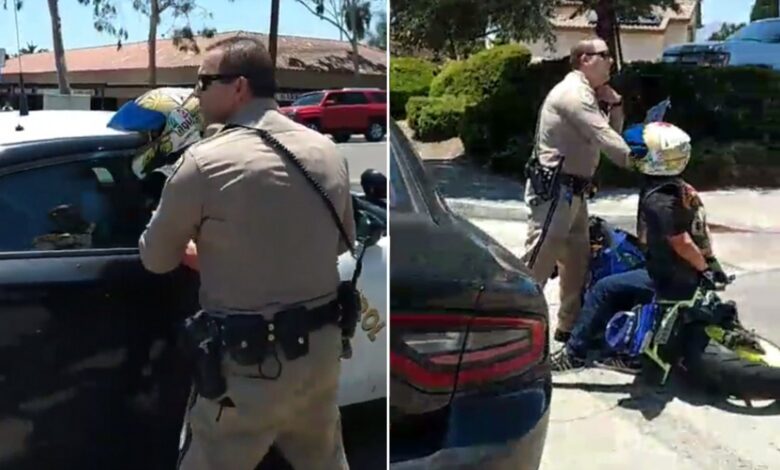
For twenty-three years, I wore the badge of a state trooper, and in that time I developed one particular specialty: harassing bikers. I pulled them over for the smallest infractions—three miles over the limit, a tinted visor, pipes that sounded a little too loud. I wrote tickets when a warning would have done. I followed groups on highways, assuming every leather vest concealed a weapon, every patch marked a criminal gang.
I told myself I was protecting the public. In truth, I was following the bias of my first mentor, a veteran sergeant who looked me in the eye on my rookie day and said: “Bikers are nothing but trouble on two wheels.” I believed him. I let that belief shape my entire career.
And then, last summer, it almost cost me my daughter.
Emma was sixteen. Smart, driven, a swimmer with Olympic dreams. When she didn’t come home from practice one evening, I told myself she was delayed. An hour later, I called her coach. By nightfall, I had reported her missing. Within hours, the department launched a full-scale search: helicopters, K-9 units, door-to-door canvassing. But by the second night, the optimism was fading. My colleagues—the same men I’d spent decades working beside—had started to give me that look. The one that says, We’re preparing you for the worst.
And then, at two in the morning, my doorbell rang.
I expected another detective with updates. Instead, I opened my door to see seven men in worn leather vests, standing under the glow of my porch light. The patches on their backs identified them instantly: the Iron Horse Brotherhood. A club I had pulled over, ticketed, and harassed for years. Their president, Thomas “Roadmap” Walker, a gray-bearded Vietnam veteran I had written up three times that month alone, met my eyes.
“Officer Reynolds,” he said evenly, without a hint of resentment, “we heard about your daughter. We ride every back road in this county. We’ve got forty members ready to start searching right now. Just tell us where the police haven’t looked.”
I almost slammed the door. My pride screamed to turn them away. But desperation does strange things. I saw something in Walker’s expression—something I hadn’t allowed myself to see in bikers before: humanity. And I realized I didn’t have the luxury of prejudice anymore.
That night, my house became a makeshift command post. Maps were spread across my dining room table, Emma’s photo passed around. The bikers listened intently as I described her habits, her favorite spots, her last known movements. They asked sharp questions, the kind I didn’t expect from men I’d always dismissed as thugs. When I mentioned a quarry she liked to visit with friends, Walker’s men exchanged glances. They knew it immediately, even though the police search had written it off after dogs tracked to the waterline.
By dawn, forty riders had fanned out across the county in small teams, checking places official units couldn’t reach. They searched abandoned factories, hidden trails, hunting cabins—territory they knew better than anyone. They weren’t bound by protocols, only by urgency.
And they found something.
Tracks from an old truck led to a hunting cabin. Inside were zip ties, Emma’s sweatshirt, and photographs of teenage girls at the quarry. My heart nearly stopped. A suspect’s name surfaced: Bobby Winstead. A drifter the bikers knew too well—a man who had once tried to join their club but was rejected for “bad vibes.” They had seen him loitering around gas stations, watching girls. They knew his truck, down to the dream catcher with bones hanging from the rearview.
While police scrambled, the bikers were already moving. They cut off escape routes, splitting into pairs to cover the vast network of logging roads. And when Winstead tried to flee with my daughter on an ATV, it was the Brotherhood who reached them first.
Emma was shaken, bruised, but alive. They wrapped her in a leather jacket, gave her water, and radioed her location until I could get there. When I arrived, she ran into my arms, whispering through sobs, “Dad, they saved me.”
That night changed me forever.
For decades I had seen these men as criminals-in-waiting, defined not by who they were but by what they wore. Yet when it mattered most, they showed more compassion, coordination, and courage than I had ever given them credit for. They saved my daughter’s life while I had spent years trying to make theirs harder.
Weeks later, when Emma was strong enough, we went to their clubhouse for a barbecue. I expected hostility. Instead, we were welcomed like family. Emma laughed with the members’ kids, while I listened to veterans talk about finding brotherhood on the road after coming home from war. I realized their patches weren’t badges of crime, but symbols of belonging.
I won’t pretend I erased decades of bias overnight. But I owned up to it. I asked my department to remove me from biker enforcement. I admitted the tickets I’d written on shaky grounds. And I began the slow process of learning to see these men not as stereotypes, but as people.
Walker told me something that has stuck ever since: “Judgment is easy. Understanding takes work.”
I had judged them for twenty-three years. In one week, they taught me more about brotherhood, compassion, and courage than I had learned in my entire career.
And every time I hear the distant rumble of motorcycles now, I don’t reach for my radar gun. I remember the night leather-clad strangers became the heroes who brought my daughter home.